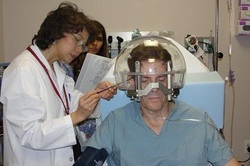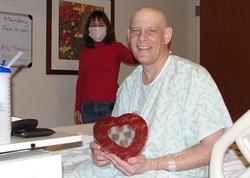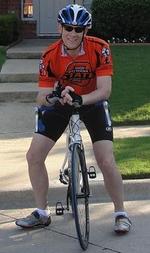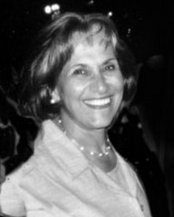 By Chris Beattie, [email protected] Originally published Friday, Oct. 26, 2012 on CarrolltonLeader.com (TX). Lung cancer is the nation's No. 1 cancer killer. And that's not just of smokers. McKinney resident Chris Haga knows first-breath just how little the disease discriminates. "I am such an odd case," said Chris, diagnosed with Stage IV non-small-cell lung cancer (NSCLC) in July 2010. "I'm active, work out, in good health - and I've never smoked a cigarette. It was pretty devastating; I felt like I'd done everything I could not to get this form of cancer." November is National Lung Cancer Awareness Month, and Chris is ever eager to get the word out: smoke or not, the disease is possible. And abundantly so in America. More than 226,000 people will be diagnosed with lung cancer this year - another person diagnosed every two minutes - according to an Uniting Against Lung Cancer report, which pulled from National Institutes of Health (NIH) and National Cancer Institute figures. There aren't many campaigns, pink ribbons or races for lung cancer, though it surpassed breast cancer as the top cancer killer of women in 1987. Twice as many women die from lung cancer each year than from breast cancer, and close to 430 people die from it every day in the U.S., according to the report. Between 15 and 20 percent of those diagnosed have never smoked, the report says, which is part of the reason more than half are diagnosed in later stages and just 15 percent are diagnosed when treatment would be most effective. "I remember thinking for maybe two seconds that it could be lung cancer," said DeLayne, Chris' wife, of his early symptoms. "I dismissed that thought completely because he's never smoked."  Far from it, actually. Chris was riding his bike 80 miles a week when he got a weird cough in April 2010. He blamed it on allergies, and after it got worse, a doctor said he had an upper respiratory infection. Then after chest x-rays, it was determined pneumonia. By July, as conditions worsened, it was time for a CT scan, which revealed a tumor on his right lung. Chris had a collapsed lung, and his second biopsy confirmed NSCLC, the most common type of lung cancer. But his diagnosis wasn't complete. Further scans and MRIs at MD Anderson Cancer Center in Houston revealed a small brain tumor. The cancer had spread to lymph nodes in Chris's chest and abdomen. His oncologist suggested he had a mutation known as EFGR, but medicine for that didn't work. Gamma Knife radiation killed the brain tumor, but post-radiation, Chris was sent to the emergency room because his lung tumor had grown and trapped fluid in his lung. Dr. John Heymach, a thoracic oncologist on-call that weekend at MD Anderson, canceled Chris' impending port surgery and his first chemotherapy session. He suggested Chris might instead have the EML4-ALK gene mutation, and urged him toward a promising clinical trial. "The treatment plan completely changed within what seemed like 30 minutes," DeLayne said. "Radiation to the lung began a few days later to immediately shrink the tumor so (Chris) could beat the pneumonia." As he awaited an ALK analysis, Chris endured 15 rounds of radiation, including one that burned his esophagus so badly he could hardly drink water. He lost 35 pounds in a few weeks. In November 2010, on his 51st birthday, Chris was told he was ALK-positive. Before his clinical trial started the following March, he went through three rounds of chemotherapy, and one chemo medication forced him to a hospital bed for a week. Tumors had spread to his lower left lung. But his oncologist knew then that Chris was the first ALK patient he'd ever seen at MD Anderson. He's since reviewed other patients' records to test for the mutation. Chris started taking Crizotinib (now Xalkori) in clinical trials. The medication targets the "Achilles' heel" of ALK-type lung cancers, according an American Cancer Society article from October 2010. That article said only about 2 to 7 percent of NSCLC patients has ALK aberrations. Eunice Kwak, an oncologist at Massachusetts General Hospital, said in the article that the drug "will not cure advanced cancers with ALK abnormalities," but patients in the drug's study were taking it for close to two years. Six weeks after Chris began taking it, there was no active tumor growth. At his 12-week checkup, his status was "in treatment with No Evidence of Disease" - what his physician's assistant deemed "as good as it gets" for advanced lung cancer patients. Doctors won't say a lung cancer patient is cured because it so often returns, DeLayne said. Because he's part of the clinical trial, Chris gets the typically $10,000-a-month medication for free. "All of the (doctors) have just been the right people in the right place at the right time for me to get on this medicine and enjoy life," Chris said. An engineer with Texas Instruments, Chris recently began customer-quality engineering for medical groups that make CT scans, MRIs, products with which he's well acquainted. "I now have a vested interest in making sure they work properly," he said.  The Hagas understand the medicine is targeted therapy and may not work forever. The cancer could realign to a new genetic location and require different treatment. But they're able to live a "pretty normal life," Chris said, one that includes spreading the word about an oft-ignored cancer. Lung cancer received just $1,420 of NIH funding per cancer death last year, nearly $18,000 less than breast cancer and $4,000 less than the next closest, colorectal cancer, stated the Uniting Against Lung Cancer report. Other medications are being tested in clinical trials that are showing promise similar to Crizotinib. Chris continues the ride, on and off the bike. He uses an incentive spirometer for daily breathing exercises. The meter range for a normal person is 2,000; he's been reaching 3,750 regularly and sometimes 4,000. Those around the Hagas know that lung cancer doesn't pick its victims based on smoking habits. And that the race of life can go on. "I'm able to do things that a lot of other cancer patients aren't able to do," Chris said. "I realize I'm a walking, talking, breathing miracle." For more of Chris' story, visit his blog at http://CancerOn2Wheels.blogspot.com.
0 Comments
Your comment will be posted after it is approved.
Leave a Reply. |
Details
|


 RSS Feed
RSS Feed
